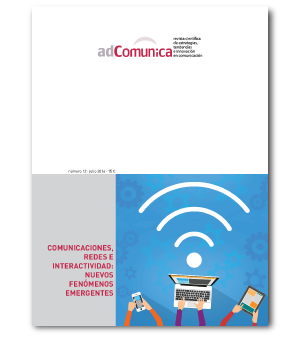El «storytelling» en la literatura científica española: hacia un estado de la cuestión
##plugins.themes.bootstrap3.article.main##
Resum
La incorporación del «storytelling» como técnica comunicativa que emplea el relato como base ha sido una constante en los últimos años en la práctica profesional de diversas áreas relacionadas con la disciplina de la comunicación. Pese a ello, la novedad de este fenómeno emergente no ha suscitado un entusiasmo de paralela intensidad en el campo científico- académico.
Así se desprende de este estudio bibliométrico que, partiendo de las bases de datos de «Teseo» y «Dialnet» para tesis doctorales y revistas científicas respectivamente, analiza la evolución de las investigaciones indexadas con el «storytelling», de acuerdo a los resultados que ofrecen sus motores de búsqueda. De este modo, solo se constatan 62 registros en esta revisión longitudinal, con una distribución desigual en la que tienen mayor peso los artículos de revistas que suponen un 91,9% del total de publicaciones científicas, frente al 8,1% que representan las tesis doctorales.
Sin embargo, la elevada concentración de publicaciones en el último bienio 2014-2015, así como la presencia cada vez mayor de la técnica en dinámicas profesionales del periodismo y la comunicación, nos sitúan en un escenario de previsible crecimiento y especialización. Con todo, la situación actual del «storytelling» en el ámbito académico español solo puede ser calificada de incipiente, si bien la existencia de todo este material sienta las bases para una prolífica producción científica.
Descàrregues
##plugins.themes.bootstrap3.article.details##
1. Política propuesta para Revistas que ofrecen Acceso Abierto
Los autores que publican en esta revista están de acuerdo con los siguientes términos:
- Los autores conservan los derechos de autor y garantizan a la revista el derecho de ser la primera publicación del trabajo al igual que licenciado bajo la licencia CC BY-SA, que permite a otros compartir el trabajo con un reconocimiento de la autoría del trabajo y la publicación inicial en esta revista.
- Los autores pueden establecer por separado acuerdos adicionales para la distribución no exclusiva de la versión de la obra publicada en la revista (por ejemplo, situarlo en un repositorio institucional o publicarlo en un libro), con un reconocimiento de su publicación inicial en esta revista.


